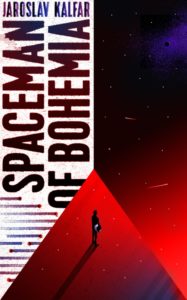 In this engaging novel, a Czech astronaut travels alone to investigate a purple dust cloud in the asteroid belt. He is a national hero but becomes lonely almost immediately, desperately so when he learns that his wife has left him in the months since he launched. Who left whom?
In this engaging novel, a Czech astronaut travels alone to investigate a purple dust cloud in the asteroid belt. He is a national hero but becomes lonely almost immediately, desperately so when he learns that his wife has left him in the months since he launched. Who left whom?
Alone and depressed, he discovers or imagines an alien in his ship, an alien also very far from home who can never go back. When the purple cloud threatens them both, they become resigned to their deaths, but the astronaut is improbably saved by a secret Russian spaceship investigating the cloud. The Russian ship crash-lands back on Earth and everyone else is killed but the Czech astronaut miraculously survives. He is presumed dead and he keeps it that way. Should he try to find his estranged wife?
Layered on this tale is the astronaut’s Proustian recall of his life as a child. His father was a torturer under the Soviet regime, and his family lived well by that occupation. Then came the revolution and the family was disgraced and driven from their home. When he returns from space he searches out the ruins of his childhood home, but is that a return? Is it possible for any of us to go back? To childhood, to a lost relationship, to a world that’s gone, to the person we were?
Having the astronaut literally leave earth was the perfect device. He didn’t just go on the road in some mythical hero’s journey. He left the planet, all of humanity, all of the world, and became a monad in the void. But life goes on. History turns. People change. You can be a part of that or not.
It’s an engaging story, about real issues, with some genuinely moving moments. Is it sci-fi? No. The space journey is a metaphor for leaving everything behind. Is it psi-fi? It is an excellent psychological story, about what it means to isolate yourself and be alone, and about the siren of the connected past. But that story could have been written about a solo long-distance sailor, a hermit monk, a reclusive spy. While there are some well-rendered details of life in space, the science is window-dressing. The novel does not show how the exigencies of living in a technological world affect one’s psychology, so it doesn’t qualify as psi-fi. It’s more about how arbitrary turns of history affect a person. Hi-fi? Recommended.
Kalfar, Jaroslav (2017). Spaceman of Bohemia. London: Sceptre/Hachette, In US: Little, Brown (273 pp).